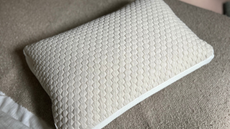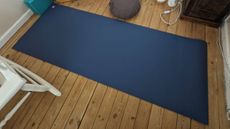As the days get shorter, many people can find themselves suffering from low mood. In its more severe form, this is known as Seasonal Affective Disorder – AKA SAD or winter depression – and it's linked to a lack of natural sunlight. One solution that works for some people is to invest in a light therapy lamp (our best SAD lamp guide has more info and recommendations), but there are other lifestyle changes that can help too.
Gemma Margerison, Resilience and Recovery Coach and author of Connected wellbeing guide, thinks that living through a pandemic has more of an impact on many of us than we might have acknowledged, too. Here, she offers some advice for how to stave off the seasonal blues and look after your wellbeing this winter.
- Try one of the best weighted blankets to ease anxiety and improve sleep
- Wake up more gently with one of the best wake-up lamps
1. Focus on wellness rather than happiness
"We're not going to be happy all of the time, and by expecting ourselves to be happy all the time we're adding more pressure to ourselves," says Gemma. "There's an obsession around being positive all of the time which I think actually creates its own problems." She suggests shifting the aim towards 'wellness' instead.
Gemma argues that this approach has multiple potential benefits: "We'd be a lot more accepting of who we are and the experiences of life. It would help us to understand that if we do feel sad or angry, or our mental health isn't as good as it should be, it's not a weakness or a lack of 'positivity'. It's not 'wrong'. It might also help you to reach out for support if you need it."
2. Try some casual mindfulness
If you've been put off from trying a mindfulness practice because you think it's going to involve sitting for long periods trying to clear your mind or contemplate your life, fear not. Mindfulness and meditation are two different things, and the former is pretty straightforward to integrate into your typical routine. One technique, for instance, is to simply lift your gaze and take a look around you.
"This is a really good thing to practice during the activities that you do repeatedly each week. For example, if you take your dog for a walk, take a look at what's around you and try to notice what's different on a day to day basis. Suddenly, you're in that present moment," says Gemma. "The buds of a flower might be starting to open, for example. You're engaging – you're being mindful in that moment and using that as a way to engage. This is what mindfulness is all about."
3. Check in on yourself
While the news surrounding the pandemic remains stressful and difficult to hear, Gemma says that your priority should be to focus on taking care of yourself. "If you feel like you need a day on the sofa with a blanket, that's absolutely fine. If you feel like you can go out for a run and do some of the things you'd normally do, that's also fine," she says. "But make sure to 'check in' on yourself, ask yourself how you are, and ask yourself what you need. Whatever the answer is, then that's what you require in that given moment."
4. Don't let one setback derail everything
Gemma likens your bad habits to a box of puppies that are constantly trying to escape and cause you problems. "A big thing about having negative habits is being able to put them back in the box. And that's fine – it's okay to have little slips. Sometimes we worry about having to be perfect at something from the get-go, where actually it's about constantly reminding ourselves that it's fine to just give something a go, or pick something up again, and to make mistakes with it." If you're struggling to form a new healthy habit, don't be disheartened; these things can take time.











